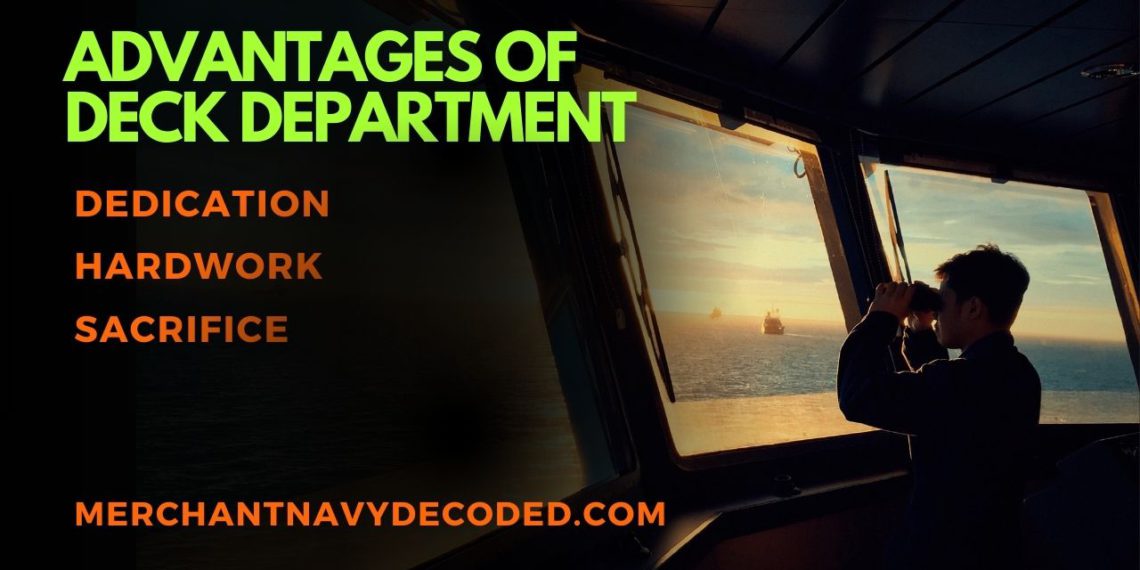Is the Deck Department a Perfect Choice for you?
Are you confused about which department you want to join?
Don’t worry. I’ve got you covered.
If you have not yet decided which side to pick, this blog is going to put in some key perspectives as to why you should join the deck side. Although, both the departments and a proper coordination between the two is key to a ship’s functioning, I have tried to highlight some basic differences between the two and some key advantages you are going to get after joining the deck side.
Points to Consider:
Now before choosing any side, here are some important decision making points to consider:
1. What are your personal preferences?
2. What are your Strengths and weaknesses?
3. Financial Situation of your family.
4. Current Hiring/Market Scenario.
5. Career progression and prospects.
Advantages of the Deck Side
Let us look at some advantages of joining the deck side considering the factors mentioned above:
1. Basic Roles
Deck officers are mainly responsible for the safe navigation of the vessel. Apart from this they are also responsible for cargo operations, maintanence of safety equipments, managing communications, managing the crew and several others.
If all of these roles adhere to you personal preferences, you are in a win-win situation.
2. Quick Head-start to your career
You can join as a deck cadet after completing a 1 year DNS course, provided you are sponsored by a good shipping company. At the age of 19-20, you are going to go onboard and start your career and start earning early.
On the other hand, to join as a Trainee Marine Engineer, you need to undergo a 4 year B.Tech course at least.
3. Current Market Scenario
Today’s Hiring Scenario has undergone a positive shift from what it was a few years back. The Employment of seafarers, especially Indian Seafarers, is looking greener than before.
“According to the latest ICS/Bimco study, we will have a shortage of 96,000 seafarers by 2026. That’s a huge challenge. That’s certified officers we’re going to be short of, so that’s something that we need to embrace”.
To read the full article click here
4. Better Working Conditions.
- Now, this depends on person to person. What’s a good work environment to one may not be for the other. The deck side offers you an open workplace most of times.
- While you are on the bridge or on the deck, you get to experience fresh air, serene beauty and a quieter workplace. This is of course, subject to sea conditions and any other exceptional conditions.
- As the Engine Room is below Deck, it is confined.
- The powerful engines and other auxiliaries generate a lot of noise and heat. Although there is an air-conditioned Engine Control Room (ECR), you cannot expect to be there all the time.
It’s not that deck officers do not have to work under tiresome conditions. Entering Enclosed spaces, Bilges, Inspections of entire ship from forward to aft, Chipping, painting are very tiresome work , especially under the gruesome sun.
Fun fact: MSC Irina , the biggest container ship today is about 400m in length and 62m in breadth. That’s about the length of 4 professional Football fields.
5. You get to write ‘Captain. X’
This is also a personal preference. Once you become a Captain, you can use it as a title before your name. Many people consider it a matter of pride and this can be a deciding factor for some. Now this may sound a little off-track to some but as a 17 year old, I surely thought about this.
If you also have this dream in mind then you have to work from right now to sow the fruits of your hard work in future. Read this article to know how and what things you need to do to become a Captain.
6. Absolute Authority
- The captain has full authority over the ship. In case of any disagreement or dispute, you are going to be one who will decide what to do and your decision will be the final one. Onboard the ship, there is no one who could question your authority.
Now remember ‘With great power, comes great responsibilities’. Are you ready to take on the responsibilities as well? That’s a question you will have to answer to yourself.
7. Developing better Man-handling skills at an early level.
- Right after you become a third officer, you have to deal with various parties and understand how to navigate your thoughts and align them with your actions.
- As a Master, you have to deal with a variety of concerned parties; the owner, the charterer, port state control, inspectors, surveyors and a lot more.
- You are exposed to a variety of professional etiquettes and duties and that may result in building better Man-handling skills.
8. Future Prospects.
Suppose you decide to quit sailing and get a job ashore. You will be surprised to know that there are ample amount of opportunities ashore once you become a Master Mariner.
Some of them are:
· Marine Pilot
· Mooring Master
· Surveyors and Inspectors
· Teaching Professionals
· Marine Insurance
· Marine Superintendents
The list goes on.
Nowadays, Shore jobs at junior levels have also opened up in various companies for various technical and management levels.
For more reference give this article a read:- READ HERE
Conclusion:
If you have read till here, I am sure you have got some perspectives about why the deck department might be advantageous for you.
Now, if you want to give wings to your dream of joining the deck department we have the right thing for you with which you can excel in every endeavor on ship deck:

Whether you choose the Deck or the Engine Department is entirely your own decision but whatever you choose make sure you understand it pretty well. Do not just pick a side because of the fruits it bears.
While choosing, I want you to remember Sri Krishna’s Words from the Bhagwat Geeta:
“Karmanye vadhikaraste Ma Phaleshu Kadachana,
Ma Karmaphalaheturbhurma Te Sangostvakarmani”
Meaning:
You have the right to work only but never to its fruits.
Let not the fruits of action be your motive, nor let your attachment be to inaction.
Disclaimer :- The opinions expressed in this article belong solely to the author and may not necessarily reflect those of Merchant Navy Decoded. We cannot guarantee the accuracy of the information provided and disclaim any responsibility for it. Data and visuals used are sourced from publicly available information and may not be authenticated by any regulatory body. Reviews and comments appearing on our blogs represent the opinions of individuals and do not necessarily reflect the views of Merchant Navy Decoded. We are not responsible for any loss or damage resulting from reliance on these reviews or comments.
Reproduction, copying, sharing, or use of the article or images in any form is strictly prohibited without prior permission from both the author and Merchant Navy Decoded.



